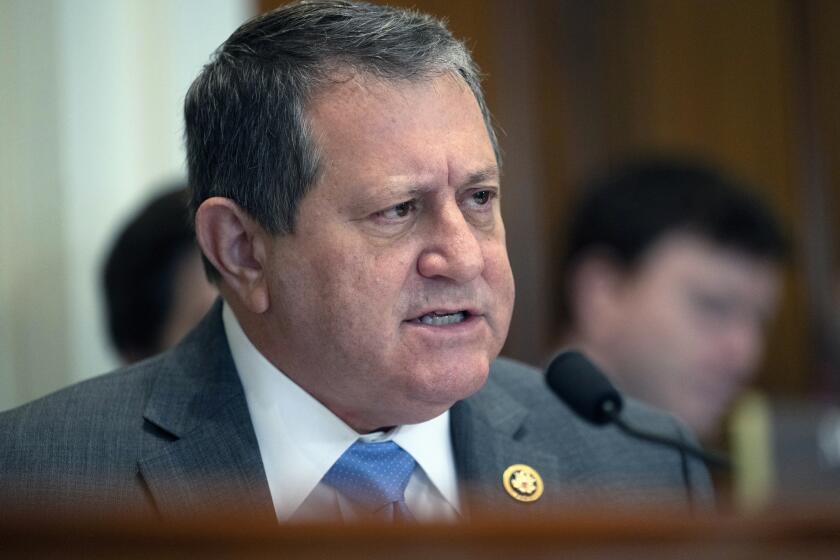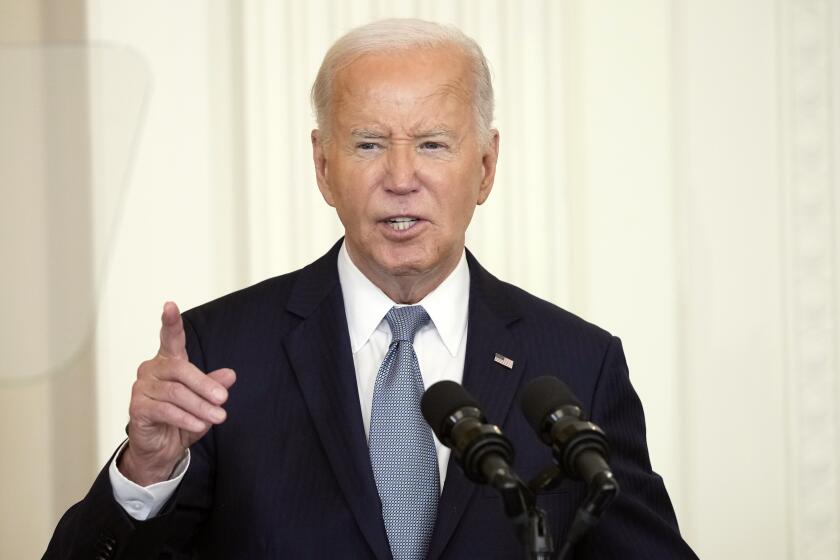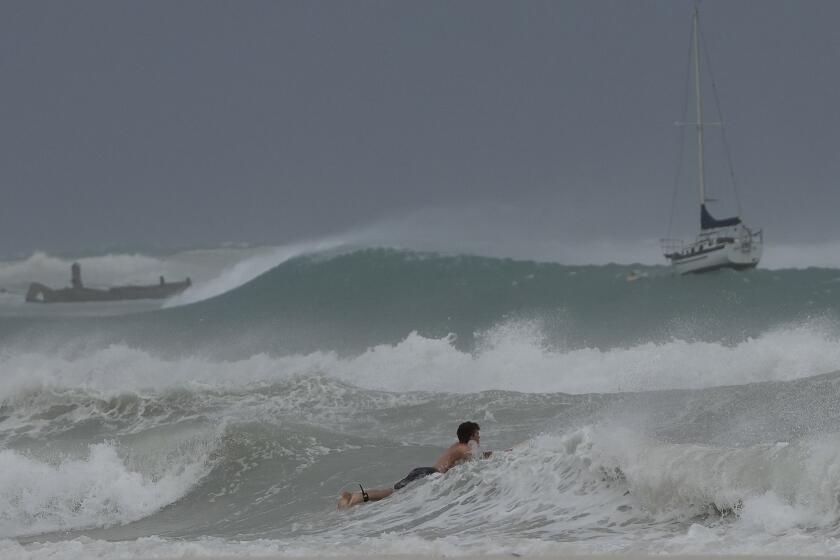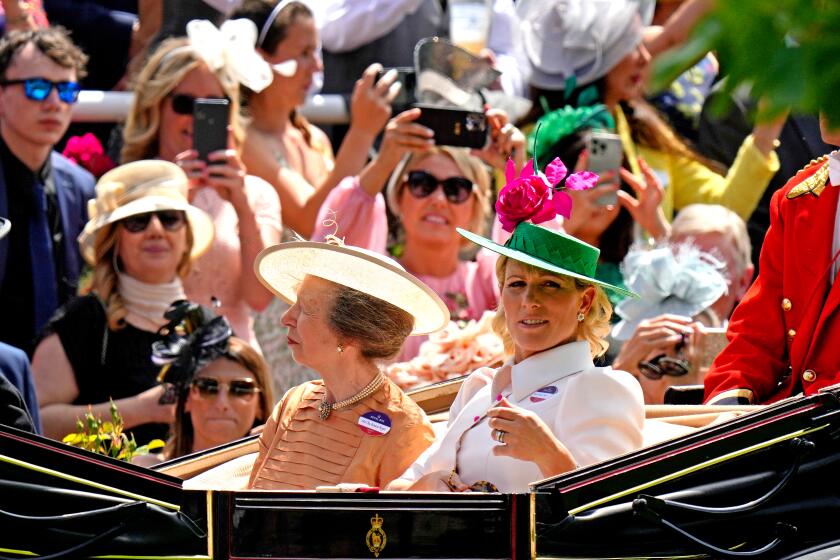Admiral Retires After Okinawa Rape Comment
One of the Navy’s most senior admirals retired under pressure Friday after saying that the U.S. servicemen charged in the September rape of a 12-year-old Okinawan girl could have hired a prostitute for the money they spent to rent the car in which the crime was committed.
Adm. Richard C. Macke, a four-star admiral and 35-year Navy veteran who was commander of U.S. forces in the Pacific, resigned effective immediately after what amounted to an expression of no-confidence by Defense Secretary William J. Perry.
Macke’s comments, made during a breakfast interview with reporters here, came only a few hours before President Clinton once again apologized for the rape incident during an interview with Japanese journalists.
Clinton had been seeking to smooth ruffled feathers in Japan over his decision this week to cancel a planned visit there because of the budget fight in Washington. The continued use of Okinawa for U.S. military bases was to have been a major topic during his trip.
Asked about the incident at the interview, Macke replied: “I think it was absolutely stupid, I’ve said several times. For the price they paid to rent the car, they could have had a girl.”
Twelve hours after he made the statement, Macke, whose command comprises U.S. forces throughout Japan and the Pacific and Indian oceans, issued a formal retraction, admitting that he had “made a serious mistake this morning” in saying what he did.
“My recent comment was the result of my frustration over the stupidity of this heinous and incomprehensible crime against the young lady,” he said. “I regret any misunderstanding my comment may have caused.”
However, Pentagon officials said Perry had ultimately decided that in the wake of the remark, it would be “impossible [for Macke] to do his job effectively.” A few minutes later, the Defense Department announced that Macke had retired.
The admiral’s abrupt retirement marked one of the more visible such cases in recent months in which a senior admiral or general has gotten into trouble because of untoward comments. Macke’s post is one of the most coveted in the military.
Ironically, Macke had been named to the post to replace Adm. Stanley R. Arthur, whose appointment had run into opposition from some women’s groups over his handling of a sexual harassment case. Although supporters said Arthur did no wrong, he eventually retired.
The remark about a prostitute was not the only one of that sort that Macke made at his breakfast session with reporters.
At one point, seeking to illustrate the difference between cultures of various countries, he pointed out that in some countries, society is so strait-laced that “even patting your own wife on the fanny” is frowned upon. By contrast, he said, in Italy reaction is not so strong.
Navy officials were especially embarrassed by Macke’s comments. Adm. Jeremy M. Boorda, the chief of naval operations, recently ordered all naval personnel to observe a one-day “stand-down” following an incident of sexual harassment.
The Navy has mounted an all-out campaign to alter attitudes on gender-related issues in the wake of the so-called Tailhook scandal in 1991. The scandal erupted when naval aviators attending a convention in Las Vegas groped and fondled women who were attending the meeting.
The White House remained silent on the Macke issue, allowing the Pentagon to handle the situation on its own. Perry, just back from a trip to the Balkan peace talks in Dayton, Ohio, conferred with key aides until late in the evening.
Sen. Dianne Feinstein (D-Calif.), a member of the Senate Foreign Relations Committee, said she was stunned by the admiral’s remarks.
“I would say to Navy Secretary John Dalton, your guys still don’t get it,” Feinstein said. “Rape isn’t about money, and it isn’t about sex. It’s about power over women, and it’s a very degrading, terrible, major felony.”
The Sept. 4 rape of the 12-year-old girl not only mortified top policy-makers here, it also set off a vehement reaction among Okinawans and renewed demands by local officials there that the United States remove its military units from the island.
There were fears by some officials that the flap ultimately might jeopardize the overall U.S.-Japan security treaty, which bound the two countries together during the Cold War, but Tokyo successfully fended off calls by Okinawans to scrap that as well.
The United States has used Okinawa as a military base since World War II, when U.S. forces captured the island from Japan. Although it since has been returned to the Japanese government, U.S. troops still occupy about 18% of the land on the island.
Shortly after the three servicemen were indicted for the rape, the commandant of the Marine Corps, Gen. Charles Krulak, flew to Okinawa to lead a 24-hour stand-down in which he ordered Marines to reflect on the incident and on the role of U.S. troops serving in foreign countries.
The incident that sparked Boorda’s decision to schedule a similar stand-down was over allegations that a Navy chief petty officer had groped a female enlistee on a civilian airliner, while two officers failed to intervene. None of them was in uniform.
Clinton said in an interview with Japanese journalists here Friday that he wanted the Japanese people to know that all Americans “share their outrage and their pain.”
“It’s a terrible thing, and every father in the world of a young daughter, including the President of the United States, was struck by this incident,” he said.
More to Read
Start your day right
Sign up for Essential California for news, features and recommendations from the L.A. Times and beyond in your inbox six days a week.
You may occasionally receive promotional content from the Los Angeles Times.






